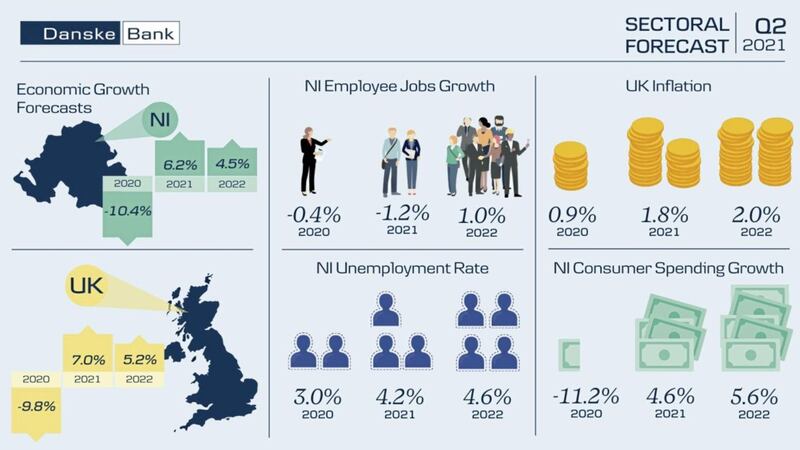THE Northern Ireland economy is on course to grow by 6.2 per cent in 2021, according to Danske Bank.
The north’s biggest lender said the economy likely returned to growth in the second quarter of this year after an expected contraction in the first quarter.
In its prevous quarterly forecast, Danske Bank anticipated the north’s economy would grow by 4.8 per cent this year before accelerating to 5.8 per cent in 2022.
But in a revised outlook out today, the lender’s Conor Lambe said economic growth in 2021 will now likely outperform next year.
As a result, the growth forecast for 2022 has been downgraded from 5.8 to 4.5 per cent.
“Following an expected contraction in the first quarter of the year, the gradual easing of coronavirus restrictions throughout the second quarter is likely to have enabled the Northern Ireland economy to return to growth,” said Mr Lambe.
“Early indicators at a UK level show a strong rebound in activity through April and May, and we expect something similar to have occurred in Northern Ireland.”

The economist said the reopening of non-essential retail and hospitality provided an outlet for pent-up consumer demand in the second quarter, resulting in a pick-up in spending.
Danske Bank forecasts 19 per cent growth for the accommodation and food services sector in 2021, with the hard hit arts, entertainment and recreation sector growing by 15 per cent.
“Assuming there are no further lockdowns and the rollout of the vaccine programme continues as planned, we expect the economy to continue expanding in the third and fourth quarters of the year,” added the economist.
Danske Bank is also forecasting fewer job losses this year than previously anticipated.
It’s anticipating an unemployment rate of 4.2 per cent for 2021, down from its previous forecast of 5 per cent.
“it’s important to note that the Coronavirus Job Retention Scheme is still providing support to the labour market,” said Conor Lambe. “We expect to see a decline in the number of jobs as the scheme unwinds and then comes to an end in September, but are hopeful that the strengthening of economic growth and labour demand may limit the rise in unemployment.”
But the economist has warned that the uncertainty around new variants of coronavirus, and the potential for further lockdowns or periods of heightened restrictions remain a risk, that could result in a revised position later in the year.




